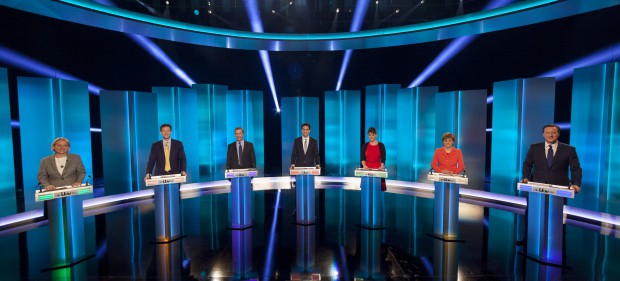The age of two-party politics is over: we know that because everyone keeps saying so. We are entering an era of coalitions, apparently, where compromise is king and a wider variety of views will be represented in parliament. These barely comprehensible seven-way television debates are the future, we are assured, and decisive general election results a thing of the past.
Look deeper and this analysis falls apart. Even now, Labour and the Conservatives between them have about two thirds of the vote, just as they did at the last general election. What we are witnessing is the collapse of the Liberal Democrats, who have been reduced — on a bad day — to being the UK’s sixth most popular party. This is the paradox of the 2015 election: the country seems destined for messy, multi-party coalition negotiations, yet Labour and Conservatives stand to hold, between them, a higher proportion of English seats than at any time since the 1980s. If the election fails to produce a decisive result, it will be because of the revolution taking place in Scotland.
As things stand, the SNP looks set to sweep most Scottish seats and supplant the Liberal Democrats as the third-largest party in Westminster. Nicola Sturgeon’s aim is to put Ed Miliband in power, then torture him. The SNP has no interest in the smooth running of the United Kingdom. It is a party of saboteurs whose stated aim is the partition of Britain. Miliband’s refusal to rule out a deal with the SNP shows that he is willing to accept their meddling as the price for power.
So the outcome of this election may well be parliamentary bedlam. But only because the two-party system will have increased its share in England, while Scotland becomes a one-party country. In that sense, this election is an entirely traditional one, since the only battle which ultimately matters is over who will make it into No. 10.
Yet as we approach the midpoint of the election campaign, neither Ed Miliband nor David Cameron are going after swing votes. They seem more interested in blowing poison darts at each other, hardly deigning to acknowledge the existence of the wider world. Both Labour and the Conservatives are run by men who spent their careers as political advisers before becoming politicians. They have been trying to outwit each other for so long that they seem, at times, to have forgotten there is a whole country out there, and a public desperate for fresh ideas.
David Cameron has so far given a perfunctory defence of conservatism — in contrast to Ruth Davidson, the Scottish Tory leader who performed magnificently in the Edinburgh debate this week (video above).
Davidson is a recent convert to the party; she is someone who thought her way into Conservatism rather than being born into it. She displayed huge passion, sincerity and common sense. Why, she asked, does the SNP want Miliband in power? Because they know he will be a disaster for the United Kingdom.
Not once did she mention a ‘long-term economic plan’ or bore the debate audience with clichés about ‘competence or chaos’. She dealt in facts: pensioner poverty is at a record low, employment at a record high. Such things don’t happen by accident: you need to vote for them. As she spoke, her passionate belief shone through that the most important thing for Britain is the election of a majority Conservative government.
It is a shame that this defence of Conservatism was to be viewed only in a country where there is very little chance that more than one Tory will be sent to Westminster. But this is precisely the language the Prime Minister should use when he is attempting to appeal to his lost tribe, especially those who have defected to Ukip.
This week he made a stab at it. He didn’t quite say ‘Come home, fruitcakes, all is forgiven’ — although considering his previous comments about Ukip supporters, that is what he might as well have said. The situation in which Mr Cameron now finds himself has much to do with the contempt he has shown for Eurosceptics and social conservatives in his party.
Even now, Labour and the Tories seem mostly to be taking heart from each -other’s weaknesses. It is as though neither party leader believes an outright victory is possible, so they do not bother to take a gamble with strategies that might deliver one. In current polls, both the Conservatives and Labour are scoring around 33 per cent and Ukip 13 per cent, with the Greens touching 7 per cent. Somewhere in there is a thumping Conservative majority, if only David Cameron could find a way of speaking to the large part of the population whose vote is still up for grabs.







Comments